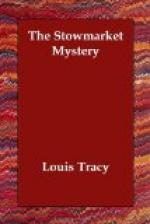The inspector did not see.
“You are making up a fine tale, Mr. Brett,” he said doggedly, “but I’m blessed if I can follow your reasoning.”
“No, of course not. Eighteen months of settled conviction are not to be dispelled in an instant. But accept my theory. This man, the guilty man, must have resided in Stowmarket for some hours, if not days. Many people saw him. He could not live in Sleagill, where even the village dogs would suspect him. But the addle-headed police, ready to handcuff David Hume, never thought of inquiring about strangers who came and went at Stowmarket in those days. Stowmarket is a metropolis, a wilderness of changeful beings, to a country policeman. It has a market-day, an occasional drunken man—life is a whirl in Stowmarket. Fortunately, people have memories. At that time you did not wear a beard, Hume.”
“No,” was the reply, “though I never told you that.”
“Of course you told me, many times. Did not your acquaintances fail to recognise you? Had not Mrs. Capella to look twice at you before she knew you? Now, Winter, start out. Ascertain, in each hotel in the town, if they had any strange guests about the period of the murder. There is a remote chance that you may learn something. Describe Mr. Hume without a beard, and hint at a reward if information is forthcoming. Money quickens the agricultural intellect.”
The detective, doubting much, obeyed. Hume, asking if there was any reason why he should not drive back to Sleagill for an hour before dinner, was sarcastically advised to go a good deal farther. Indeed, the sight of that tiny type-written slip had stirred Brett to volcanic activity.




